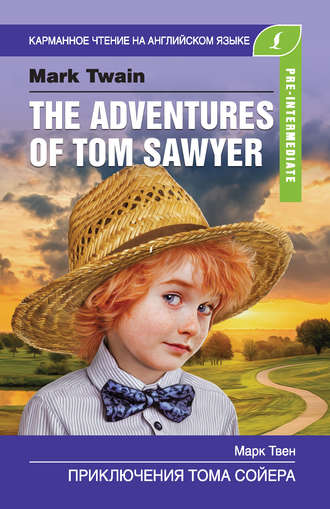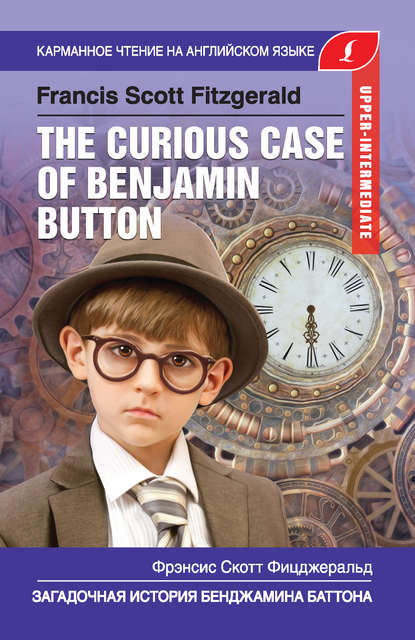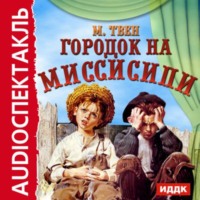
Полная версия
Приключения Тома Сойера / The Adventures of Tom Sawyer

Марк Твен / Mark Twain
Приключения Тома Сойера / The Adventures of Tom Sawyer
© Кутумина О. А., адаптация текста, словарь
© ООО «Издательство АСТ», 2019
Chapter I
“TOM!”
No answer.
“TOM!”
No answer.
“What’s happened with that boy, I wonder? You TOM!’
No answer.
Aunt Polly pulled her spectacles down and looked over them about the room; then she put them up and looked out under them. She even bent down,poked under the bed with the broom[1], and found nothing but the cat.
“Y-o-u-u TOM!”
There was a slight noise behind her and she turned just in time to seize a boy.
“There! What have you been doing in the pantry?”
“Nothing.”
“Nothing! Look at your hands. And look at your mouth. What IS it?”
“I don’t know, aunt.”
“Well, I know. It’s jam—that’s what it is. I’ve told you forty times not to touch it. Where’s my switch?”
“Wow! Look behind you, aunt!”
The old woman turned round, and the boy fled on the instant—he climbed up the high fence, and disappeared over it.
His aunt Polly stood surprised a moment, and then laughed.
“I can never learn anything!He’s played the same trick enough for me to remember it[2]! You can’t learn an old dog new tricks. I’m sure he won’t go to school this afternoon, and I’ll just have to make him work tomorrow, to punish him. It’s hard to make him work on Saturdays, when all the boys are having a holiday. But he hates work more than he hates anything else, so I’ve GOT to find some job for him.”
She was right. Tom didn’t go to school, and he had a very good time.
While Tom was eating his dinner later, and stealing sugar as opportunity offered, Aunt Polly asked him questions—for she wanted to catch him lying.
Said she:
“Tom, it was warm in school, wasn’t it?”
“Yes, mam.”
“Powerful warm, wasn’t it?”
“Yes, mam.”
“Didn’t you want to go in a-swimming, Tom?”
Tom searched Aunt Polly’s face, but it told him nothing. So he said:
“No, ma—well, not very much.”
The old lady reached out her hand and felt Tom’s shirt, and said:
“But you ain’t too warm now, though.”
Tom knew what was coming, now. So he said:
“Some of us pumped water on our heads—mine’s still damp. See?”
Aunt Polly got upset that she had overlooked that bit of circumstantial evidence. Then she had a new inspiration:
“Tom, you didn’t have to undo your shirt collar where I sewed it, to pump on your head, did you? Unbutton your jacket!”
Tom opened his jacket. His shirt collar was securely sewed.
“Bother! Well, I was sure you skipped school and went swimming. But I forgive ye, Tom.This time.”
But then Sid, Tom’s younger brother, said:
“You sewed his collar with white thread, but now it’s black.”
“Why, I did sew it with white! Tom!”
But Tom did not wait for the rest. As he went out at the door he said:
“Siddy,I’ll lick you for that[3].”
In a safe place Tom examined two large needles that he had stick into the lapels of his jacket. They both had thread attached to them—one needle had white thread and the other black. He said:
“She’d never noticed if it hadn’t been for Sid. Sometimes she sews it with white, and sometimes she sews it with black. I wish she picked one or the other—I can’t keep track of them!”
Tom was not the model boy of the village. But Sid was—and Tom hated him sometimes.
Within two minutes, or even less, he had forgotten all his troubles because he found a new interesting activity—whistling. He had learned to whistle a couple of days ago and now he decided to practise it.
The summer evenings were long so he had a lot of time ahead.
Конец ознакомительного фрагмента.
Текст предоставлен ООО «Литрес».
Прочитайте эту книгу целиком, купив полную легальную версию на Литрес.
Безопасно оплатить книгу можно банковской картой Visa, MasterCard, Maestro, со счета мобильного телефона, с платежного терминала, в салоне МТС или Связной, через PayPal, WebMoney, Яндекс.Деньги, QIWI Кошелек, бонусными картами или другим удобным Вам способом.
Примечания
1
poked under the bed with the broom – пошарила под кроватью щеткой
2
He’s played the same trick enough for me to remember it – он проделывал этот трюк со мной достаточно много раз, чтобы я могла его запомнить
3
I’ll lick you for that—теперь тебе мало не покажется












